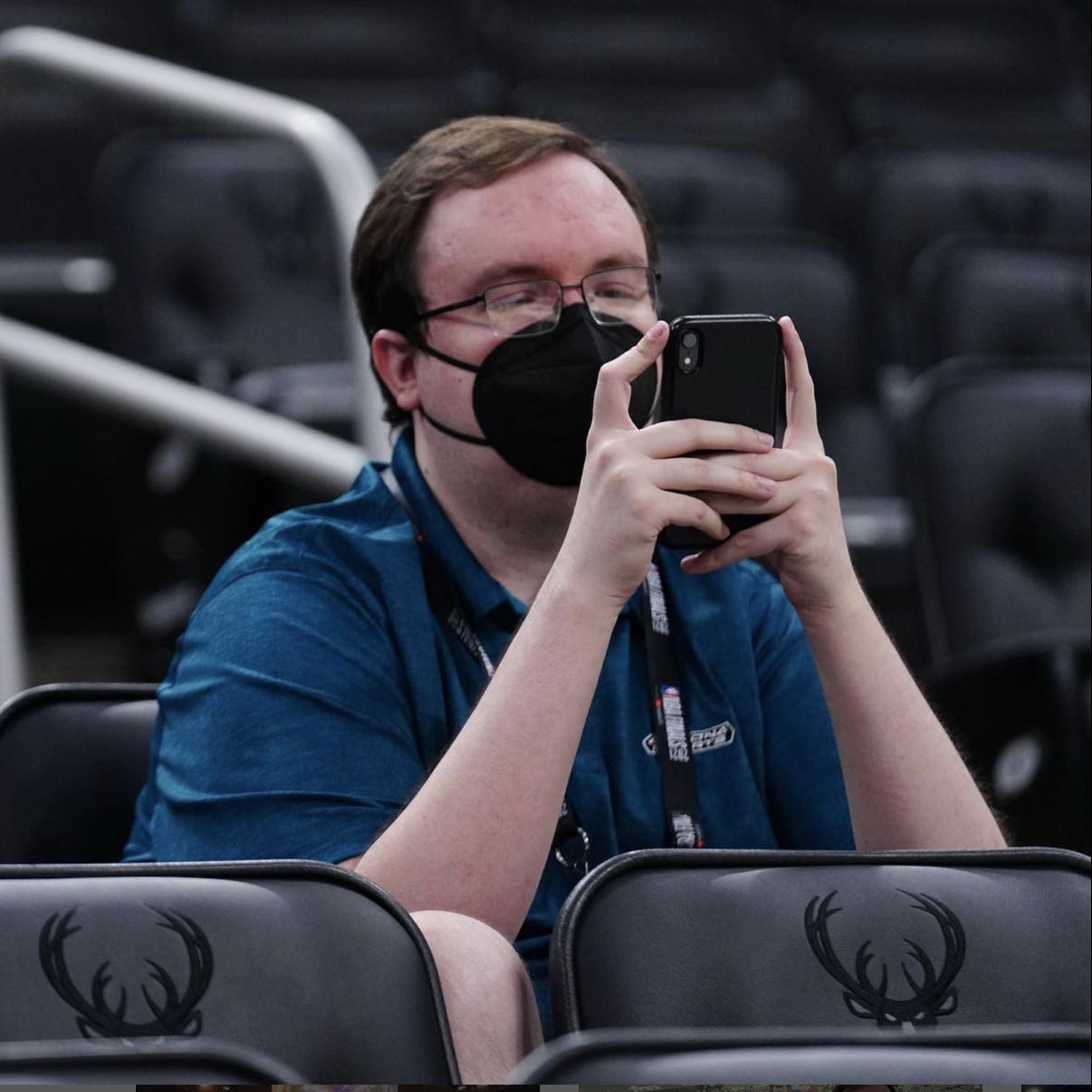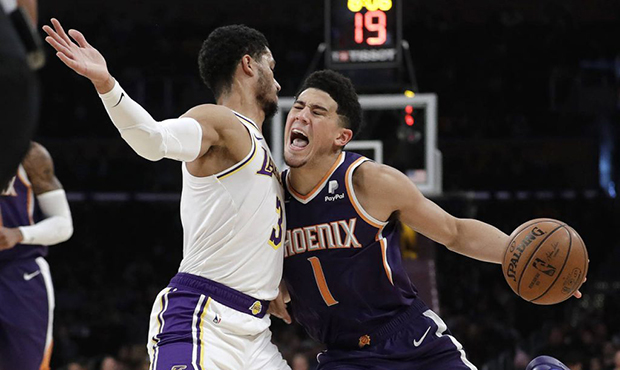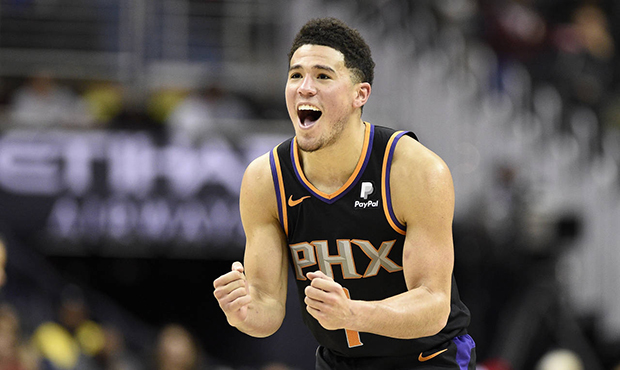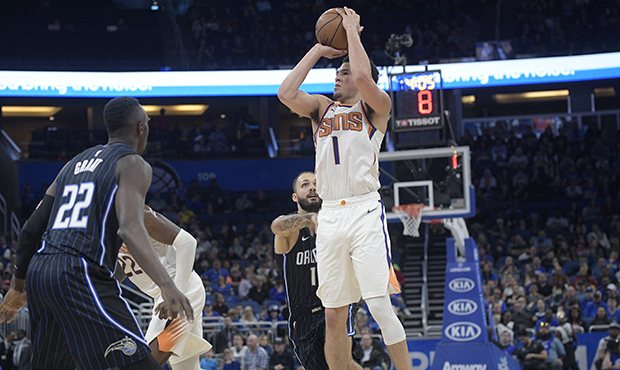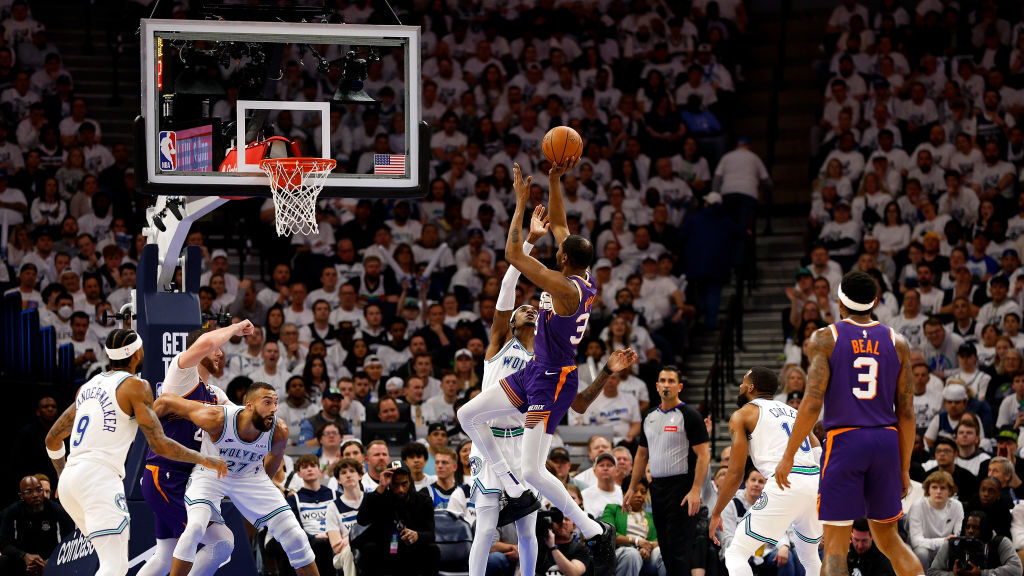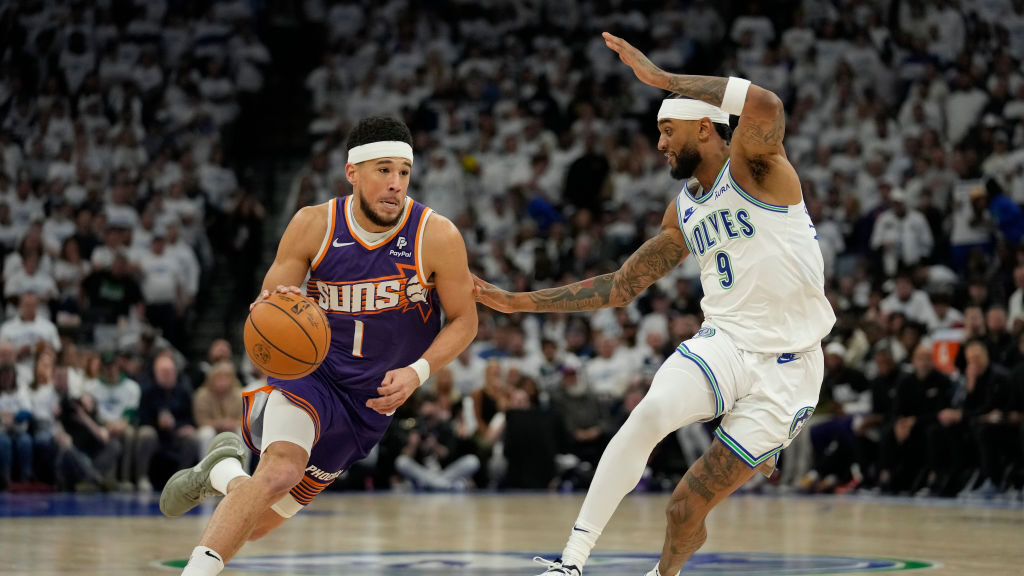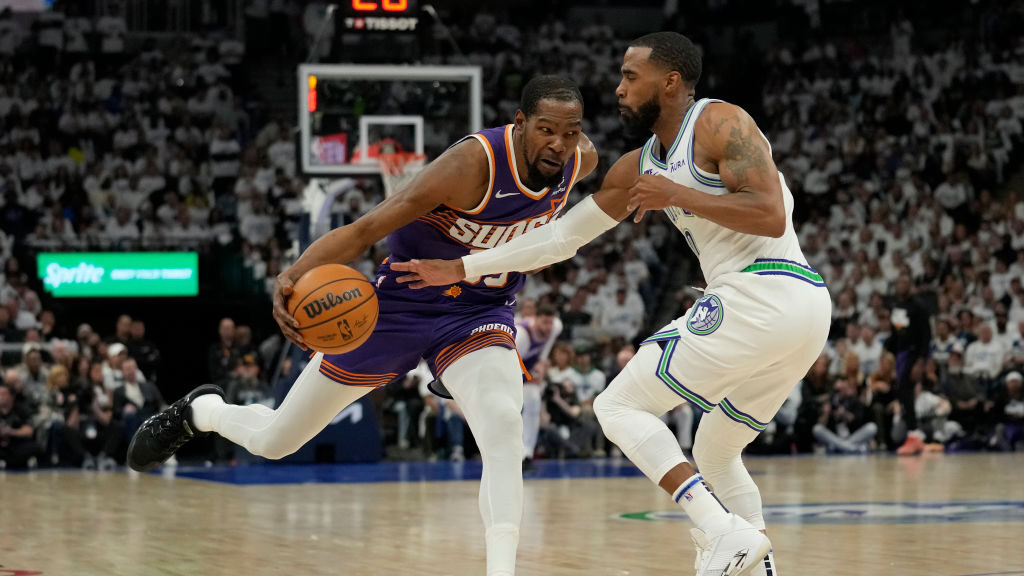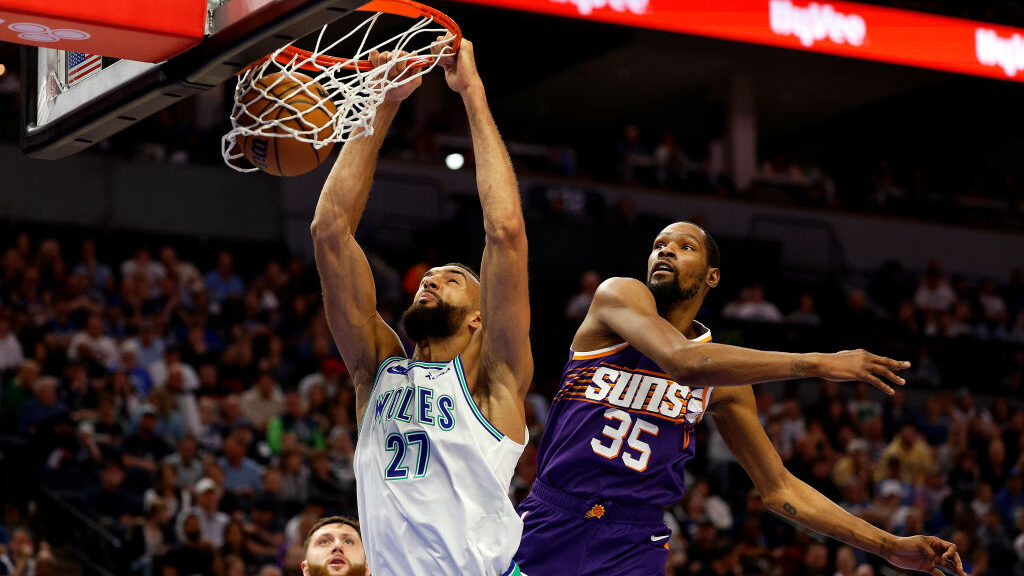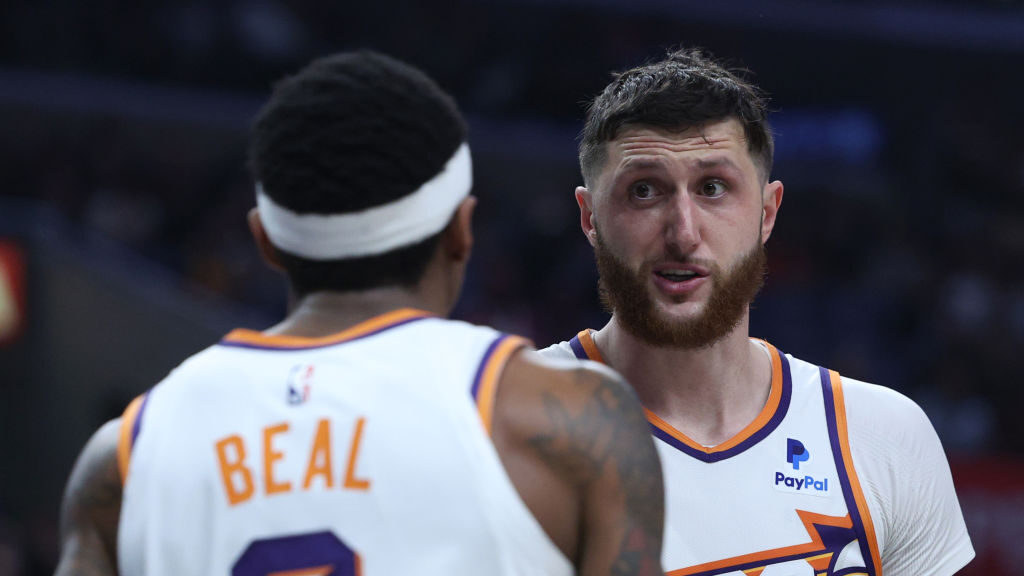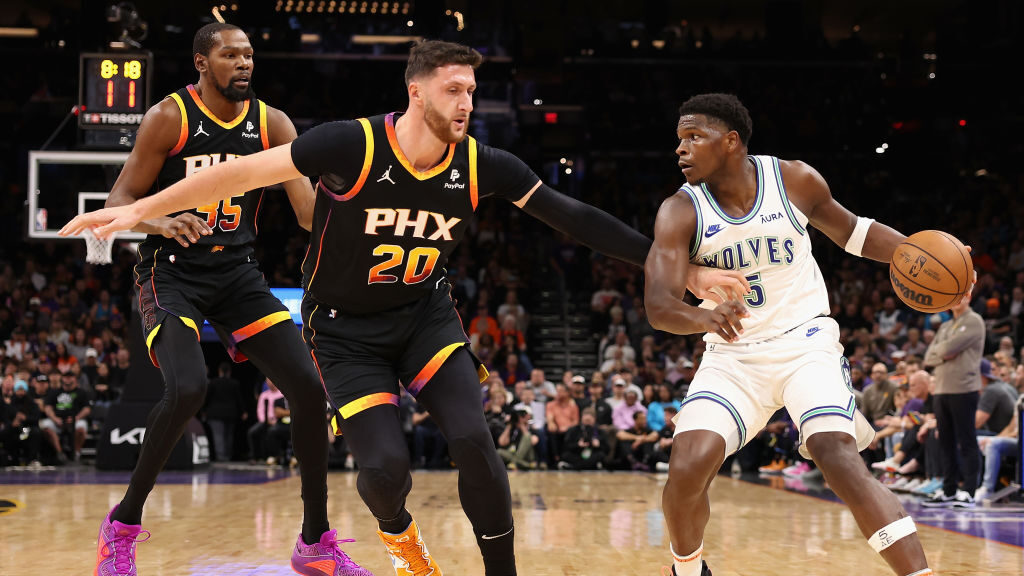Josh Jackson stuck in crowded wing group, background of Suns’ rebuild
Jan 4, 2019, 1:05 PM
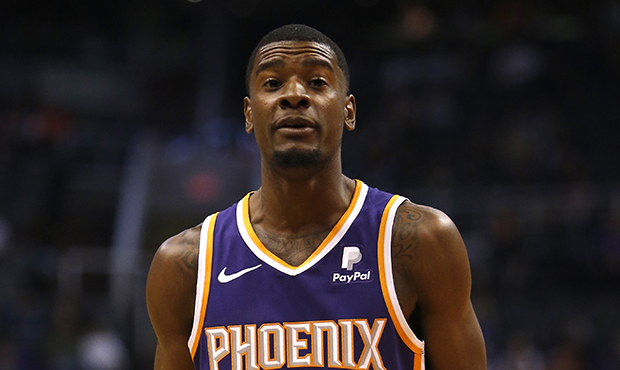
(AP Photo/Rick Scuteri)
(AP Photo/Rick Scuteri)
When you walk by the West end of Talking Stick Resort Arena near the set of the Phoenix Suns’ pre- and post-game show, there’s a banner displaying some of the featured acts at the center.
That includes the Suns players, and the three faces you see are Deandre Ayton, Devin Booker and Josh Jackson.
Makes sense. Booker is one of the best young players in the NBA, Ayton is the No. 1 pick and Jackson was a top-5 pick.
Now, however, when you walk into the Suns’ parking garage, there’s a poster that was recently updated after Trevor Ariza was traded. Six Suns players appear on it, and Jackson isn’t one of them anymore.
That speaks to how quickly Jackson has faded into the background only one year after being selected No. 4 in the 2017 NBA Draft.
We will get to how Jackson to this point hasn’t developed as many have hoped, but the Suns front office has played a part in this too. We should hit on that first.
They brought back a coach, Earl Watson, that had Jackson guarding Blake Griffin in his third-career game. That coach got fired three games in.
The general manager that drafted him, Ryan McDonough, is gone. The last time Jackson played with a legitimate NBA point guard was when Eric Bledsoe wanted to be in Phoenix. He’s been thrown into a secondary, sometimes even primary, playmaking role in his second year when he was clearly not ready for that yet.
They traded a valuable asset to acquire rookie Mikal Bridges. They signed Ariza. They traded Ariza for Kelly Oubre Jr.
The logic behind this that isn’t necessarily flawed. “You can never have too many wings in today’s NBA!”
Jackson has been flung all over the Suns’ rotation, and long-term plans while going through it all hasn’t been friendly toward his development, as he noted in his diary on The Undefeated.
Imagine if I had certain things every rookie has. I didn’t have everything they had. I didn’t have veteran guys around me. I didn’t have a point guard passing me the ball. I didn’t have a stable coach situation, sets to run.
There is no argument against adding all these facts together and concluding that Jackson would be flourishing in another destination, or still could.
With that being said, a lot of this to do with what is obviously a lack of trust in Jackson and how he projects as a player in the future.
Jackson came out of Kansas as a tremendous athlete with top-level defensive potential and a pinch of ball-handling skills that added up to a two-way wing with loads of promise.
The running joke is referring to that version — when we see it — as “Kansas Josh Jackson.” Kansas Josh Jackson is a playmaking, switchy wing who explodes whenever he gets the ball or is defending it.
Josh Jackson with 6 points, 4 assists, 3 rebounds and 0 turnovers in the first half. Here's the dimes: pic.twitter.com/dT99fU6c12
— Matt Petersen (@TheMattPetersen) December 27, 2018
It’s a running joke because he’s a different player now.
Jackson wasn’t a playmaker enough as a rookie, but boy oh boy has he been trying to make up for lost time this season.
A chunk of Jackson’s turnovers this year are on plays where he gets stuck in the air, a big no-no since the earliest levels of basketball.
It’s OK not to have a plan when you’re driving and attacking the rim as long as you show a good understanding of thinking and reacting on the fly. That’s, uh, not in Jackson’s arsenal at the moment.
Jackson is using up 24.2 percent of his team’s offensive possessions when he’s on the floor and turning the ball over 19.2 percent of the time when he does so, a 7-percent rise in turnovers compared to his numbers last year.
When you factor in Jackson’s terrible efficiency, a 45.5 true shooting percentage, there aren’t many players like him.
In fact, taking those three numbers and plugging them into Basketball-Reference to see if anyone has ever done this, the answer for players that were relevant is no.
Heading into games onJan. 4, here's how all #NBA players have fared in TPA during the 2018-19 season: pic.twitter.com/CHX1PttJAy
— NBA Math (@NBA_Math) January 4, 2019
Change each of those numbers by 2 percent to find some common ground and you’ve got New York Knicks point guard Emmanuel Mudiay in his rookie year and Houston Rockets point guard Micahel Carter-Williams’ second year. For the past four seasons, that’s not great company, to say the least.
Jackson’s poor finishing at the rim is his biggest bout in terms of efficiency to this point.
The league average for shooting percentage at the rim is around 58 percent this season.
Last year he was at 53.1 percent at the rim and it’s where he grew during his strong close to the season. Jackson shot 59.8 percent there in February, and even better, 60.9 percent of the shots he took were within nine feet of the rim, the highest that number has ever been for him. Once again in March, Jackson was above league average around the rim, converting 58.9 percent of his attempts.
For a rookie, that’s a start.
This year, though, he’s dropped off dramatically to 45.5 percent shooting at the cup.
Well, that number had to be better in December when he played his best ball, right? Wrong. A disastrous 43.1 percent.
So when you’re already not a good mid-range shooter and posting a 26.3 three-point shooting percentage, that’s how you wind up at a 38.8 field goal percentage.
The saving grace for Jackson was the Suns’ turnaround in December. Phoenix was notably feeding off the energy of the second unit that predominately features Jackson.
Jackson’s -2.4 net rating ranked as the highest among the team’s rotation players for the duration of the month. That’s encouraging and a critical tidbit, because Jackson’s individual numbers didn’t improve. He shot 37.1 percent and had a 0.98 assist-to-turnover ratio.
It helps he has a revitalized motor and non-stop intensity, swinging games for the team despite hurting the Suns on offense.
That clear change in mentality reflects in the way he’s playing defense.
Sometimes, Terrence Ross is burning the Suns so bad that Jackson wants to be the one to put an end to it and the desire is so high he does this.
Sometimes, he contains himself more and is capable of countless possessions like this: denying post position on a larger scorer like Aaron Gordon, denying again from a second angle, denying the kickout pass from a third angle, denying the driving lane a fourth time and forcing a turnover.
Great Jackson defense. pic.twitter.com/oSU1mYQ1rp
— Kellan Olson (@KellanOlson) January 4, 2019
Those are possessions that swing and win games.
Jackson’s defensive playmaking instincts have flashed far more in his second season.
He’s got a good feel for reaching in and stripping.
We aren’t quite at the level yet where Jackson is a factor as a weakside shot blocker, but there have been signs of life.
He’s turned recovery and chase-down blocks into a signature skill.
The Suns’ defensive rating drops from 113.8 when Jackson is off the floor to 106.8 when he’s playing.
Take a grain of salt or seven for the number of times Jackson is out of position, usually not due to a lack of effort, and there’s a lot of upside left for him as a defender.
So what do you do with a 21-year-old effective energy wing who is a train wreck offensively?
Let’s go back to those around him because that’s the most important part of this discussion.
Jackson was initially drafted as the best player available for the Suns, but also as the perimeter defensive stopper they needed with T.J. Warren not doing enough for the Suns to draft outside of his position.
Then, the Suns trade for Bridges, who is essentially an upgraded role player version of Jackson. He brings the most value defensively and doesn’t need the ball in his hands to contribute. The main difference is Bridges is a high-IQ floor spacer on offense while Jackson is the Tasmanian devil and can’t shoot. Bridges, also, is arguably a better defender right now.
Ariza was a logical addition as a veteran, and Jackson coming off the bench for one season shouldn’t have been seen as a deterrent.
Sure, a role change from one of the Suns’ primary options at the end of last season to energy guy off the bench is drastic, but one that favors Jackson’s development. Warren’s growth as a small-ball four also has opened up the logjam.
Where we hit a skid in the road is Oubre.
Oubre is better than Jackson at what Jackson is supposed to be great at. He’s a better defender, far better scorer and is a legitimately good NBA player. Jackson, on the other hand, has been one of the league’s worst players at his low points this season.
Oubre is a restricted free agent this summer and 98.7 FM Arizona’s Sports Station’s John Gambadoro reports that could cost up to $15 million per year or more.
The Suns can afford to pay Oubre and they should, but what gets tricky is Jackson’s 2020-21 team option at a pricey $8.9 million and a potential extension the following year.
Is Jackson worth that money? Even if there’s an argument to be made that he is, should the team’s fifth-most important wing be paid that much? Do they have enough patience to see if he should be paid period?
These are the types of long-term questions the Suns have to ask themselves a lot sooner because of Oubre’s impending deal and their holes across the roster.
If the Suns are out on Jackson, they have to avoid another situation like Dragan Bender or Marquese Chriss giving them virtually no return. If something is available, moving Jackson before February as part of a deal for a more substantial long-term piece has to be at least highly considered, if not preferred.
If the Suns are in on Jackson, they need to make life easier around him. Playing him with more switchy wings and an athletic second unit has been a start, but getting the ball out of his hands more and getting more trustworthy ball-handlers in general on the roster is the next step. Once Jackson limits erratic play on both ends in a defined role, he could start to see more of the playmaking responsibilities while his body develops and added weight benefits his finishing and defending.
One way or another, the Suns can’t afford another dud from McDonough’s draft record. Urgency is of the essence, something the organization has been lacking this season except when it’s time to fire the leader of the front office nine days before the start of the season.

